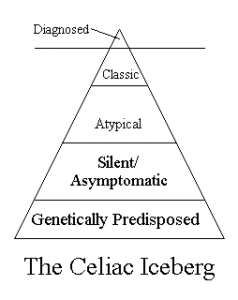You Don’t Need to Have Celiac Disease to Go Gluten-free

The Majority with Celiac Disease Remain Undiagnosed
We’re living in an interesting time. Celiac disease was originally described in 250 AD but it wasn’t until 1888 that an astute clinician named Gee described it scientifically. Yet over a century, later the vast majority of the cases are still unidentified.
Why?
Is it because a disease that’s considered “rare” is not often looked for?
Is it because there’s no drug to treat it?
Is it because celiac patients are thought to fit into a narrow symptomatic category of unrelenting diarrhea along with extreme weight loss and lethargy?
“Yes” is no doubt the answer to many of those questions.
Celiacs are Often Being Treated for the Wrong Disease
The facts today are that an estimated 1-4% of our population has a celiac disease with only about 5-7% of that group receiving an accurate diagnosis. That means there are a lot of people suffering from celiac disease who are instead being treated for problems, that gluten has caused, with a drug that is at best only masking the symptom or at worst creating more problems due to dangerous side effects.
Gluten Intolerance Affects 10 Times More People
If that wasn’t enough diagnostic ineptitude, now consider that celiac disease is only the very tip of a very large iceberg known as Gluten Intolerance, that embraces both celiac disease and gluten sensitivity.
The current estimate is that gluten sensitivity, also a genetic condition is present in a minimum of 10% of the population. (Personally I feel that the percentage is greater.) Suddenly 1% sounds pretty small.
Further consider that if only 5% of the population with celiac disease have been diagnosed, what minuscule amount of those suffering from gluten sensitivity have any idea that it’s playing a role in their ill-health? – very few I can tell you.
Too Many Suffer Needlessly
Why did I spend a good portion of two years writing the book The Gluten Effect? Because I couldn’t stand the fact that gluten sensitivity was so completely unknown and misunderstood by the medical profession and society at large.
Day in and day out for the past 16 years, patients with a myriad of health problems had those issues completely resolved by discovering that they were gluten sensitive. It was no longer sufficient to only help the people who came into our clinic. It was time to share this information with the world. It’s a grassroots movement but each week I see the awareness increasing in our society and while much slower than I’d like, it’s gratifying none the less.
The science behind gluten causing a malfunction in many different systems of the body is strong and the clinical evidence is beyond compelling. From fatigue to obesity, from depression to ADD, from IBS to arthritis, that little protein found in wheat, rye, and barley can wreak havoc on bodies susceptible to it.
What are Currently the Best Lab Tests?
At this writing, there are lab tests available to discover if you have a gluten intolerance, but they’re not perfect. They’re much better than they’ve been with the introduction of new tests this year, but they’re still not as sensitive as we would like, which means that the possibility of false negatives does occur. To avoid inconclusive results as much as possible we utilize a 3-pronged approach here at Root Cause Medical:
1. We eliminate gluten from the diet for a minimum of 4 to 8 weeks before reintroducing it – we often find reintroduction unnecessary when a patient becomes convinced that it’s a problem.
2. We utilize a comprehensive blood test to assess the immunoglobulins G and A (these are part of the immune system) to not only the protein gliadin but over 10 other fractions of the gluten protein that can cause health problems.
3. We utilize an immunoglobulin saliva test to assess immunoglobulin (part of the immune system) A and M’s reaction to gliadin and transglutaminase (an enzyme), making this a good test for detection of celiac disease and gluten sensitivity.
In this way, we try to minimize the false negative reactions that abound in this field. We consider the gold standard test to be a patient whose symptoms abate after removing gluten from their diet, only to have them reappear when gluten is again introduced.
A caution: due to the serious effects that gluten can cause, such reintroductions are often “accidents” rather than intentional. Intentional ingestion of gluten after a positive test of any kind is not at all recommended.
Broad Screening is Needed
In Italy they screen children for celiac disease the way we screen our children for scoliosis – every child is evaluated. It is my hope that screening for gluten intolerance will be something done for every child and adult in this country before long. Accurately identifying gluten intolerance can not only prevent many of the serious diseases we are plagued with as a society, but it will extend life expectancy.
Do you need help with your health?
We have the diagnostic and testing tools, the clinical experience, and a different medical approach to discovering the root cause of why you have the symptoms that are bothering you. As long as you are ready to make some dietary and lifestyle changes, we can help you. We will "hold your hand" through the changes, step by step, to make each step an easy one. We are located in Clearwater, FL, at 1000 S Ft Harrison, at the corner of Ft. Harrison Ave. and Magnolia St. There is plenty of parking space directly accessible from Ft Harrison. If it is not convenient for you to come to Root Cause Medical Clinic, we offer telehealth/telemedicine consultations to residents of certain states. Call us for details.
Contact us for a Consultation – Call 727-335-0400

Dr. Vikki Petersen DC. CCN
Founder of Root Cause Medical Clinic
Certified Functional Medicine Practitioner
Dr Vikki Petersen is a public speaker, author of two books, several eBooks and creates cutting edge content for her YouTube community. Dr Vikki is committed to bringing Root Cause Medicine and its unique approach to restoring health naturally to the world.
Ask a Doctor
Have a health concern you'd like to speak with a doctor about? Or just want clarity on a subject? Ask Us!



